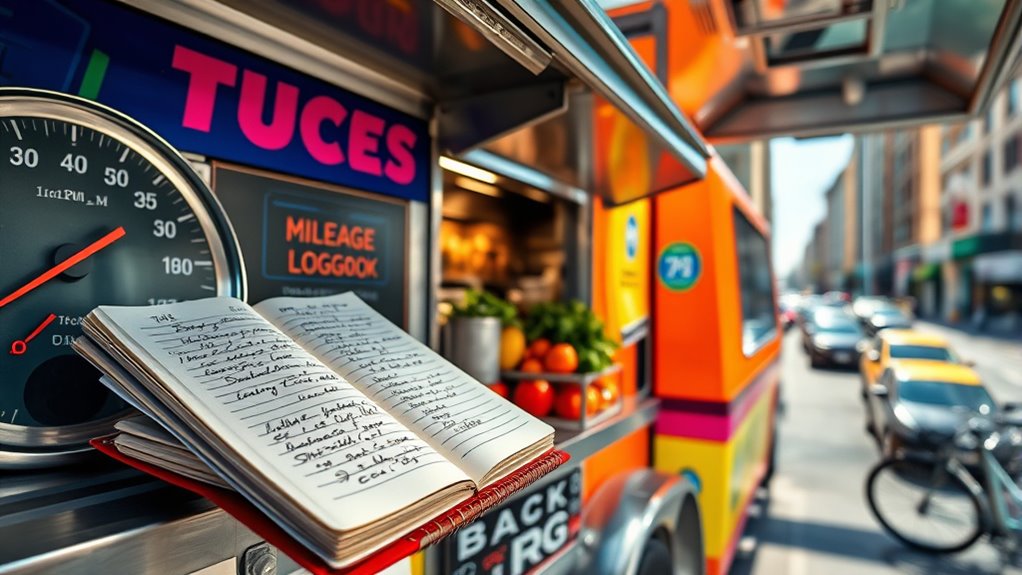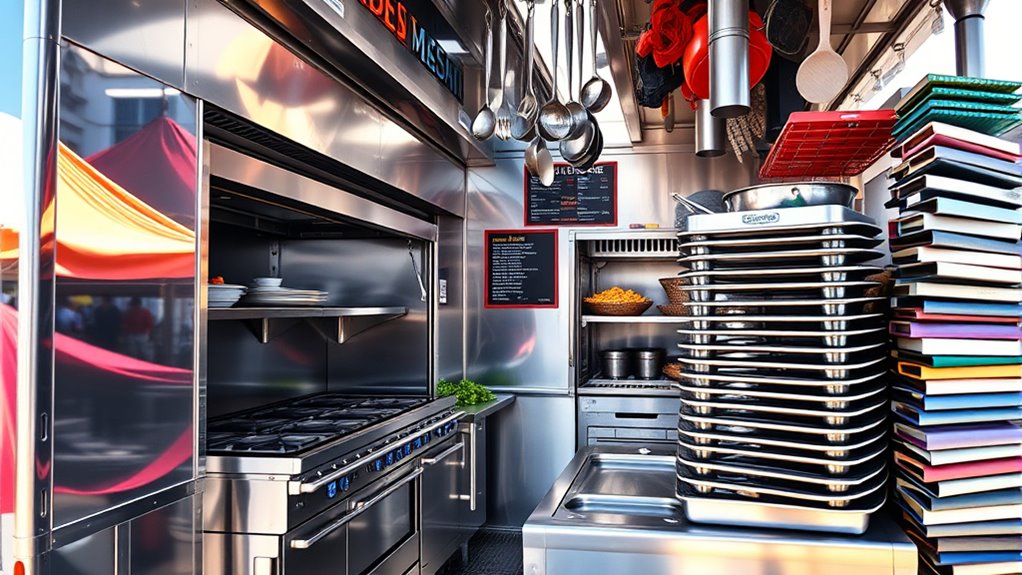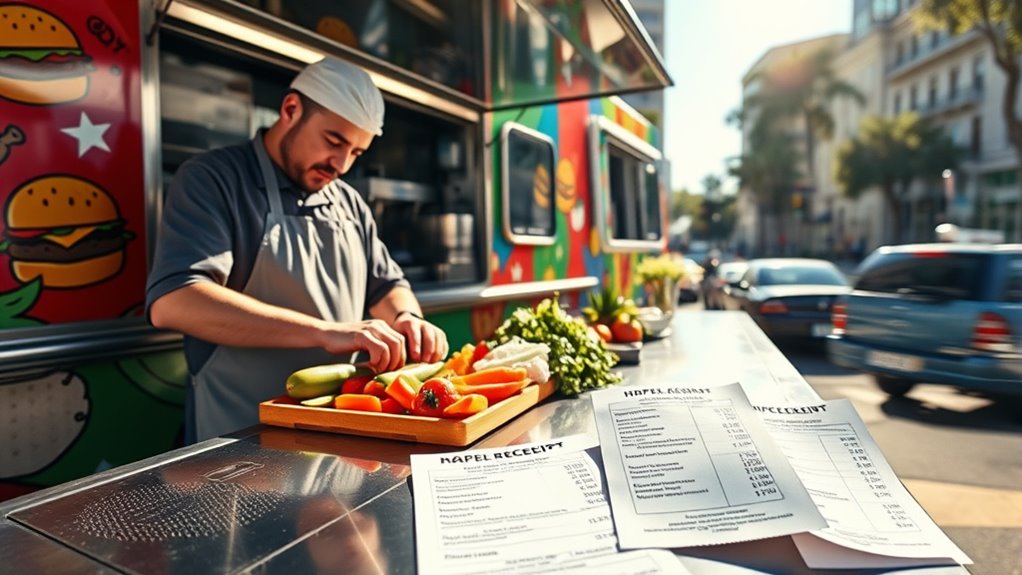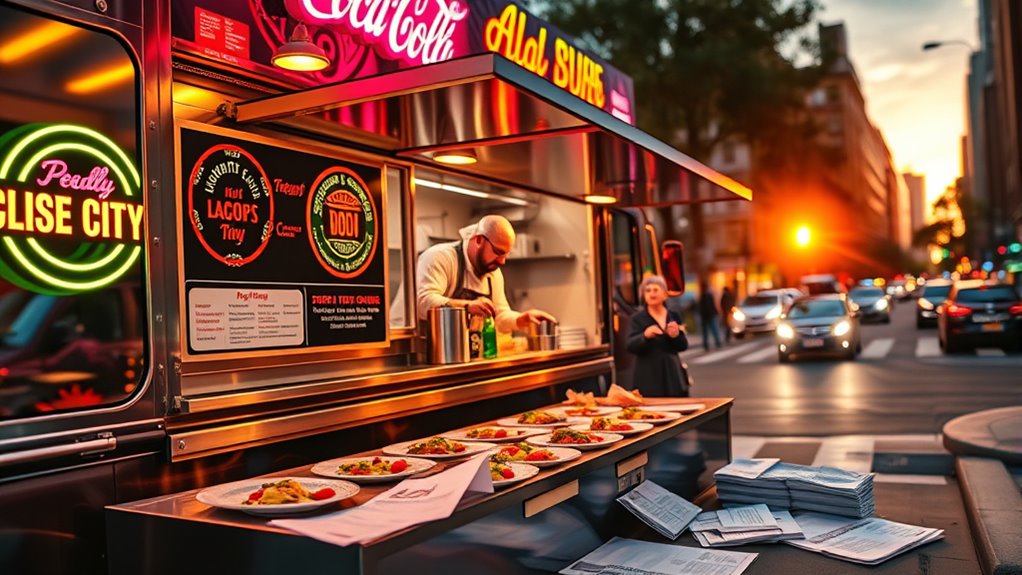As a food truck owner, you can deduct vehicle expenses like fuel, maintenance, and mileage, along with costs for essential equipment and kitchen supplies. Don’t forget food and beverage costs, staff uniforms, and utility bills. Marketing expenses, including social media ads and promotional materials, are also deductible. Keeping detailed records guarantees you maximize these deductions and stay compliant. Explore further to discover how these strategies can help you save more on taxes.
Key Takeaways
- Deduct vehicle expenses, including mileage, fuel, parking fees, and maintenance costs, for business-related travel.
- Claim deductions for equipment, kitchen supplies, inventory, and utility bills necessary for food truck operations.
- Write off marketing expenses such as advertising, social media campaigns, and promotional materials to boost visibility.
- Deduct costs for staff uniforms, cleaning supplies, and other daily operational supplies.
- Track and document all expenses meticulously to ensure compliance and maximize allowable deductions during tax filing.
Vehicle and Mileage Expenses

When it comes to managing your food truck’s expenses, vehicle and mileage costs are often among your biggest deductions. You can deduct fuel costs that keep your truck running and enable you to reach events and customers. Keep detailed records of your fuel purchases and mileage logs to substantiate your claims. Parking fees also count as deductible expenses when you pay for parking during your routes or at event sites. Be sure to track these fees carefully, as they add up quickly. Using a mileage tracking app can simplify this process and ensure accuracy. Remember, maintaining organized records of your fuel expenses and parking fees helps maximize your deductions and keeps you compliant with IRS requirements. Additionally, understanding the effectiveness of eye patches can serve as a useful analogy for how proper record-keeping and targeted deductions can enhance your overall tax strategy. Regular reviews of your expenses can reveal additional deduction opportunities, and staying informed about industry trends can help you identify new ways to save on taxes. Utilizing digital tools designed for expense tracking can further streamline your record-keeping efforts.
Equipment and Kitchen Supplies

Keeping your food truck stocked with the right equipment and kitchen supplies is essential for smooth operations and quality service. Proper tools ensure efficiency and help you deliver consistently great food, boosting your food truck branding. Items like fryers, grills, and prep stations are common deductible expenses. Additionally, supplies like utensils, storage containers, and cleaning gear are necessary for daily tasks. Investing in quality equipment can also enhance your social media marketing by showcasing your professional setup. Maintaining proper inventory is vital for managing expenses and ensuring your truck operates seamlessly. Staying organized with your supplies not only helps control costs but also aligns with personal development principles of goal setting and self-improvement. Regularly reviewing your supply inventory can help identify gaps and prevent shortages that could disrupt service. Implementing an effective inventory management system can further streamline your operations and reduce waste. Here’s a quick overview:
| Equipment | Supplies |
|---|---|
| Cooking appliances | Food storage containers |
| Refrigeration units | Cleaning tools |
| POS systems | Branding signage |
Food and Beverage Costs

Managing your food and beverage costs is essential for maintaining profitability. Your menu design plays a pivotal role—focusing on items that maximize profit margins while minimizing waste helps control expenses. Be strategic with ingredient purchasing to reduce spoilage and overstocking. Staff uniforms are also part of your costs; choosing durable, easy-to-clean options can save money over time. Keep track of costs related to beverages and ingredients, guaranteeing they align with your sales. Regularly review supplier prices and negotiate for better deals when possible. Proper menu planning and staff presentation directly influence your overall food and beverage expenses, so stay attentive to these details. Additionally, monitoring beverage sales can help identify popular items and optimize your drink offerings. Implementing cost control measures such as portion control and waste reduction strategies can further improve your profit margins. For instance, utilizing efficient inventory management systems can help prevent overordering and spoilage. Staying informed about mental wellbeing can also support staff morale and productivity, indirectly benefiting cost management. Being aware of wall organization systems can also contribute to a more efficient workspace, reducing clutter and streamlining operations. By managing these costs effectively, you’ll improve your profit margins and ensure your food truck remains financially healthy.
Business Operating Expenses

Understanding and controlling your business operating expenses is essential for maintaining profitability. These expenses include costs necessary for daily operations that aren’t directly tied to food. Managing expenses like staff uniforms and utility bills can notably impact your bottom line. For example, staff uniforms promote a professional image and are deductible. Utility bills, such as electricity and water, keep your food truck running smoothly and are also deductible. To stay on top of your expenses, regularly review your bills and supplier costs. Consider energy-efficient appliances to reduce utility bills. Keep track of all receipts and invoices for accurate deductions. Properly managing these costs ensures your food truck remains profitable and compliant with tax regulations. Additionally, understanding the history of food preparation techniques can help identify cost-effective methods and improve operational efficiency. Being aware of cost-saving strategies in food prep and service can further enhance your profitability. Regularly evaluating your supply chain can also help find more affordable sourcing options and reduce overall expenses.
Marketing and Advertising Deductions

Marketing and advertising expenses are essential for attracting customers and growing your food truck business. You can deduct costs related to social media campaigns, which include creating content, boosting posts, and paying for advertising space. These efforts help increase your visibility and reach potential customers. Additionally, print advertising, such as flyers, posters, and local newspaper ads, also qualifies as a deductible expense. Keep records of all advertising materials and expenses to substantiate your deductions. Remember, promotional expenses directly linked to your business are legitimate deductions, so don’t overlook small costs like designing and printing promotional materials. Properly documenting your advertising efforts can help ensure you maximize your deductions during tax season. Tracking your marketing expenses diligently can also help you identify the most effective strategies for future campaigns. Regularly reviewing your advertising ROI can guide you in allocating your budget more efficiently. Incorporating these deductible expenses into your tax planning can significantly reduce your taxable income and improve your overall profitability. For instance, utilizing data analytics can help you analyze the effectiveness of your campaigns and refine your marketing approach. By investing in effective marketing strategies, you can boost your business while also reducing your taxable income.
Frequently Asked Questions
Can I Deduct Expenses for Food Truck Parking Permits?
You can deduct expenses for parking permit costs and parking meter fees if they’re necessary for your food truck business. These costs are considered ordinary and necessary business expenses, so keep records of your receipts. As long as parking permits and meter fees directly relate to your operations, you can include them as deductions on your taxes, helping to reduce your overall taxable income.
Are Licensing Fees Deductible for Food Truck Operations?
They say, “Better safe than sorry,” and that applies to your business license and vehicle registration fees. You can deduct these licensing fees if they’re necessary for your food truck operation. Keep track of expenses related to your business license and vehicle registration, as they’re considered essential costs. By doing so, you guarantee your deductions are legitimate and your finances stay in order, helping your business thrive.
How Do I Claim Deductions for Employee Wages?
To claim deductions for employee wages, you need to accurately report employee wages and withholding taxes through employee wage reporting. Keep detailed records of all wages paid and payroll tax deductions made. When filing taxes, include these wages and deductions to reduce your taxable income. Properly managing payroll tax deductions guarantees you maximize your deductions while remaining compliant with tax laws, saving you money and avoiding penalties.
Can I Deduct Costs for Food Truck Customization and Branding?
Yes, you can deduct costs related to vehicle upgrades and trademark branding for your food truck. These expenses improve your business’s appearance and recognition, making them eligible for deductions. Keep receipts for upgrades like new paint, vehicle modifications, or custom signage. Branding expenses, such as logo design and promotional materials, are also deductible. Just guarantee these costs are directly related to your business to qualify for deductions.
Are Insurance Premiums Fully Deductible for Food Trucks?
You can generally deduct insurance costs for your food truck as a business expense, but it’s not always fully deductible. The IRS allows you to deduct the portion that relates to your business use, and you may also claim vehicle depreciation if your truck qualifies. Keep detailed records of insurance premiums and how you use your truck to guarantee you’re maximizing your deductions while staying compliant.
Conclusion
By taking advantage of these tax deductions, you can keep more cash in your pocket and focus on serving great food. From vehicle expenses to marketing costs, every dollar saved is like finding a hidden treasure chest in your business adventure. Just remember, staying organized and keeping good records is your secret weapon—think of it as your own personal Swiss Army knife. With these tips, you’re well on your way to making your food truck a roaring success!









